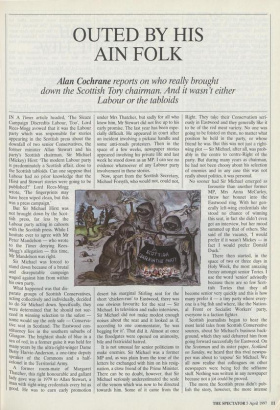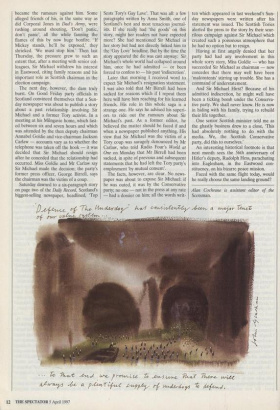OUTED BY HIS AIN FOLK
Alan Cochrane reports on who really brought
down the Scottish Tory chairman. And it wasn't either Labour or the tabloids
But Sir Michael Hirst was not brought down by the Scot- tish press, far less by the Labour party acting in cahoots with the Scottish press. While I hesitate ever to agree with Mr Peter Mandelson — who wrote to the Times denying Rees- Mogg's allegation — this time, Mr Mandelson was right.
Sir Michael was forced to stand down because of a brutal and disreputable campaign waged against him from within his own party. What happened was that dis- parate groups of Scottish Conservatives, acting collectively and individually, decided to do Sir Michael down. Specifically, they were determined that he should not suc- ceed in winning selection to the safest some would say the only safe — Conserva- tive seat in. Scotland. The Eastwood con- stituency lies in the southern suburbs of Glasgow. The brightest shade of blue in a sea of red, in a former guise it was held for many years by the ultra-right-winger Dame Betty Harvie-Anderson, a one-time deputy speaker of the Commons and a half- colonel in the Territorial Army. A former room-mate of Margaret Thatcher, this right honourable and gallant lady gave way in 1979 to Allan Stewart, a man with right-wing credentials every bit as good. He was to earn early promotion under Mrs Thatcher, but sadly for all who knew him, Mr Stewart did not live up to his early promise. The last year has been espe- cially difficult. He appeared in court after an incident involving a pickaxe handle and some anti-roads protesters. Then in the space of a few weeks, newspaper stories appeared involving his private life and last week he stood down as an MP. I can see no evidence whatsoever of any Labour party involvement in these stories.
Now, apart from the Scottish Secretary, Michael Forsyth, who would not, could not, desert his marginal Stirling seat for the short 'chicken-run' to Eastwood, there was one obvious favourite for the seat — Sir Michael. In television and radio interviews, Sir Michael did not make modest enough noises about the seat and it looked as if, according to one commentator, 'he was begging for it'. That did it. Almost at once the floodgates were opened on animosity, bile and fratricidal hatred.
It is not unusual for senior politicians to make enemies. Sir Michael was a former MP and, as was plain from the tone of the letters he exchanged with him on his resig- nation, a close friend of the Prime Minister. There can be no doubt, however, that Sir Michael seriously underestimated the scale of the venom which was now to be directed towards him. Some of it came from the Right. They take their Conservatism seri- ously in Eastwood and they generally like it to be of the red meat variety. No one was going to be foisted on them, no matter what position he held in the party, or whose friend he was. But this was not just a right- wing plot — Sir Michael, after all, was prob- ably in the centre to centre-Right of the party. But during many years as chairman, he had not been choosy about his selection of enemies and in any case this was not really about politics, it was personal.
No sooner had Sir Michael emerged as favourite than another former MP, Mrs Anna McCurley, threw her bonnet into the Eastwood ring. With her gen- erally left-wing credentials she stood no chance of winning this seat, in fact she didn't even get an interview, but her mood summed up that of others. She said of the vacancy, 'I would prefer if it wasn't Mickey — in fact I would prefer Donald Duck.'
There then started, in the space of two or three days in Holy Week, the most amazing frenzy amongst senior Tories. I use the word 'senior' advisedly because there are so few Scot- tish Tories that they all become senior very quickly and this is how many prefer it — a tiny party where every- one is a big fish and where, like the Nation- al Front or Socialist Workers' party, everyone is a faction fighter.
Scottish journalists began to hear the most lurid tales from Scottish Conservative sources, about Sir Michael's business back- ground, which they said debarred him from going forward successfully for Eastwood. On the Scotsman and its sister paper, Scotland on Sunday, we heard that this rival newspa- per was about to 'expose' Sir Michael. We all now realise that colleagues on other newspapers were being fed the selfsame stuff. Nothing was written in any newspaper because not a jot could be proved.
The more the Scottish press didn't pub- lish the story, however, the more intense became the rumours against him. Some alleged friends of his, in the same way as did Corporal Jones in Dad's Army, were rushing around shouting, 'Don't panic, don't panic', all the while fanning the flames of this by now huge bonfire. 'If Mickey stands, he'll be exposed,' they shrieked. 'We must stop him.' Then last Thursday, the pressure grew to such an extent that, after a meeting with senior col- leagues, Sir Michael withdrew his interest in Eastwood, citing family reasons and his important role as Scottish chairman in the election campaign.
The next day, however, the dam truly burst. On Good Friday party officials in Scotland convinced themselves that a Sun- day newspaper was about to publish a story about a past relationship involving Sir Michael and a former Tory activist. In a meeting at his Milngavie home, which last- ed between six and seven hours and which was attended by the then deputy chairman Annabel Goldie and vice-chairman Jackson Carlaw — accounts vary as to whether the telephone was taken off the hook — it was decided that Sir Michael should resign after he conceded that the relationship had occurred. Miss Goldie and Mr Carlaw say Sir Michael made the decision; the party's former press officer, George Birrell, says the chairman was the victim of a coup.
Saturday dawned to a six-paragraph story on page two of the Daily Record, Scotland's biggest-selling newspaper, headlined, 'Top Scots Tory's Gay Love'. That was all: a few paragraphs written by Anna Smith, one of Scotland's best and most tenacious journal- ists. If she really had `the goods' on this story, might her readers not have expected more? She had mentioned Sir Michael in her story but had not directly linked him to the 'Gay Love' headline. But by the time the story appeared the die was cast anyway: Sir Michael's whole world had collapsed around him, once he had admitted — or been forced to confess to — his past 'indiscretion'.
Later that morning I received word to expect Sir Michael's resignation statement. I was also told that Mr Birrell had been sacked for reasons which if I repeat them here will have him reaching for his learned friends. His role in this whole saga is a strange one. He says he advised his superi- ors to ride out the rumours about Sir Michael's past. As a former editor, he believed the matter should be faced if and when a newspaper published anything. His view that Sir Michael was the victim of a Tory coup was savagely denounced by Mr Carlaw, who told Radio Four's World at One on Monday that Mr Birrell had been sacked, in spite of previous and subsequent statements that he had left the Tory party's employment 'by mutual consent'.
The facts, however, are clear. No news- paper was about to expose Sir Michael: if he was outed, it was by the Conservative party; no one — not in the press at any rate — had a dossier on him; all the words writ- ten which appeared in last weekend's Sun- day newspapers were written after his statement was issued. The Scottish Tories alerted the press to the story by their scur- rilous campaign against Sir Michael which created such a poisonous atmosphere that he had no option but to resign.
Having at first angrily denied that her party had had any involvement in this whole sorry story, Miss Goldie — who has succeeded Sir Michael as chairman — now concedes that there may well have been `malcontents' stirring up trouble. She has a command of understatement.
And Sir Michael Hirst? Because of his admitted indiscretion, he might well have been a ticking bomb under the Conserva- tive party. We shall never know. He is now in hiding with his family, trying to rebuild their life together.
One senior Scottish minister told me as the ghastly business drew to a close, 'This had absolutely nothing to do with the media. We, the Scottish Conservative party, did this to ourselves.'
An interesting historical footnote is that next month sees the 56th anniversary of Hitler's deputy, Rudolph Hess, parachuting into Eaglesham, in the Eastwood con- stituency, on his bizarre peace mission.
Faced with the same flight today, would he really choose the same landing ground?
Alan Cochrane is assistant editor of the Scotsman.



























































 Previous page
Previous page